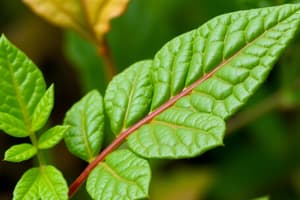Podcast
Questions and Answers
What is the primary subject of the content provided?
What is the primary subject of the content provided?
- Geology
- Botany (correct)
- Chemistry
- Zoology
Which of the following best describes the author of the content?
Which of the following best describes the author of the content?
- An educator in the field of botany (correct)
- A scientist specializing in zoology
- A researcher in chemistry
- A student studying environmental science
What can be inferred about the content based on the author's presentation style?
What can be inferred about the content based on the author's presentation style?
- It likely contains in-depth scholarly research
- It utilizes a visual format for younger students
- It aims to provide introductory knowledge in botany (correct)
- It is intended for advanced botany students only
Which statement about the author’s name is correct?
Which statement about the author’s name is correct?
What is most likely the focus of the series based on the title?
What is most likely the focus of the series based on the title?
Flashcards
Botany
Botany
The scientific study of plants, including their structure and processes.
Photosynthesis
Photosynthesis
The process by which plants turn sunlight, CO2, and water into glucose and oxygen.
Plant Taxonomy
Plant Taxonomy
The classification of plants into hierarchical categories to understand their relationships.
Plant Physiology
Plant Physiology
Signup and view all the flashcards
Molecular Botany
Molecular Botany
Signup and view all the flashcards
Study Notes
Botany Overview
- Botany is the scientific study of plants, encompassing their structure, properties, and biochemical processes.
- It involves the classification, identification, and study of plant species and their interactions within ecosystems.
- Important branches of botany include taxonomy, physiology, ecology, and biochemistry.
Key Concepts in Botany
- Plant Taxonomy: The classification of plants into hierarchical categories; essential for identification and understanding relationships among species.
- Photosynthesis: The process by which plants convert sunlight, carbon dioxide, and water into glucose and oxygen, fundamental for life on Earth.
- Plant Physiology: Focuses on the functions and vital processes of plants, including growth, reproduction, and responses to environmental stimuli.
Importance of Botany
- Essential for food production, medicine, and environmental conservation.
- Understanding plant interactions with ecosystems aids in biodiversity conservation and sustainability efforts.
- Plays a critical role in addressing issues related to climate change and agriculture.
Applications and Impact
- Agricultural advancements, such as crop improvement and pest control, depend on botanical research.
- Medicinal plant research leads to the discovery of new pharmaceuticals and therapies.
- Conservation efforts are informed by botanical studies that track species health and habitat loss.
Studying Botany
- Botany includes both fieldwork and laboratory research, emphasizing hands-on experience and observation.
- Tools used in botany range from microscopes for cellular studies to field charts for ecological surveys.
- Engaging with local ecosystems enhances understanding of regional flora and its ecological significance.
Current Trends in Botany
- Increasing focus on molecular botany and biotechnology applications for genetic modification and hybrid plants.
- Research into plant responses to climate change and developing heat-resistant or drought-tolerant species.
- Ecosystem services provided by plants, such as air and water purification, are a growing area of study.
Studying That Suits You
Use AI to generate personalized quizzes and flashcards to suit your learning preferences.



